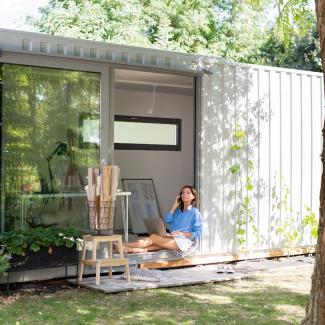With spring around the corner our customers in Hertford have been asking us about Summer houses or garden buildings, as they are looking for ways to gain that ever-needed extra space, many are used for a workshop, home office, or even a playroom for the children.
But when it comes to the most important aspect the electrics, there are a few crucial considerations to keep in mind to ensure that your electrics are safe, reliable, and fit for purpose.
- Electrical Safety: first and foremost, make sure that your electrics are planned and installed by a certified and qualified electrician. Check that all electrical fittings, such as light switches, sockets, and fuse boxes, are properly installed, in good working order and fit for the environment they are in.
- Power Supply: there are two ways of getting a power supply to your garden room and the best option depends highly on its use. You can either choose to connect your summer house to the main fuse board in your home, this can only be done if your current board meets current regulations. or you can install a separate power supply. The second option is our preferred method as it keeps the garden room separate from the home electrics and prevents any unwanted tripping should it occur.
- Electrical Wiring: The wiring in your garden room must meet the same wiring regulations as if it was being installed in your home. Depending on how the wiring is run in the fabric of the building, the wiring should be protected not buried in insulation and enclosed in conduit, which helps to prevent damage from water, moisture, and other environmental factors.
- Lighting: Lighting is a key aspect of any garden room. Lighting can create that ambience for night or day and if your garden room is to be used as workshop it may be brightness that you desire. It is important that all light fittings are fit for their environment.
- Heating and Cooling: Depending on your location the climate can determine on the level of heating or cooling you need. A small heater or air conditioner can help to keep your summer house toasty or cool, even in extreme weather conditions. Make sure whatever system you choose it sufficient for the space you have, again make sure these are installed by a qualified or competent professional. Follow the link to calculate the correct size heater for your area https://www.jjb-electrical.com/electric-heating-calculator
- Sockets and Switches: sockets and switches are another key component of any summer house electrics. Choose outlets that are suitable for the intended use and plan the layout so you get your sockets and switches in the best positions for you. For example, if you plan to use your summer house as a workshop, you may want to install outlets near your workbench. If you plan to use your garden room as a home office, you may want sockets and internet points near your desk.
- Certification: all electrical installations should be tested and inspected by your electrician to make sure that meet all the current wiring regulations. Upon completion this should be issued to you and your electrician will go through the results. Follow the link to see why it’s important to use registered electricians. https://www.jjb-electrical.com/blog/why-use-registered-electrician
- Maintenance: Regular maintenance is essential to ensure that your summer house electrics continues to function safely and efficiently. Make sure to have your system checked regularly by a qualified electrician, and address any issues or problems as soon as they arise. This will help to prevent potential safety hazards, and it will also help to extend the life of your electrics
If you want to discuss your electrical needs for your garden room give us a call today: 01992 276087


